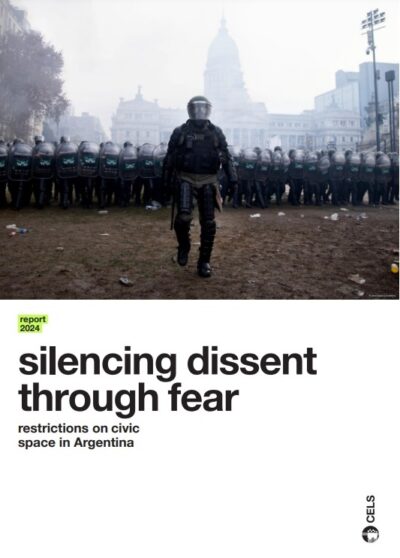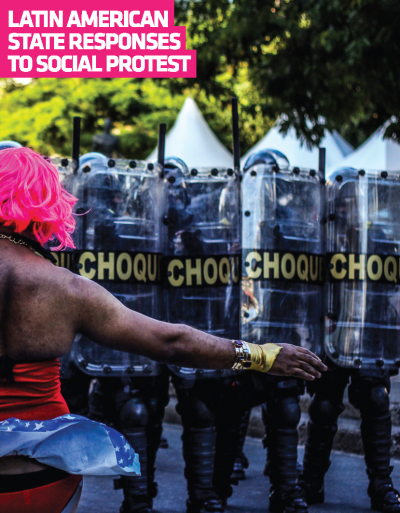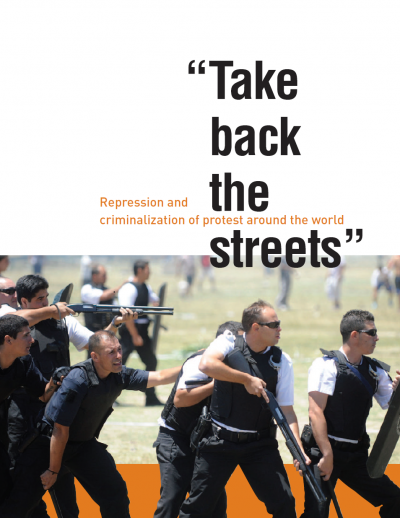Silencing dissent through fear. Restrictions on civic space in Argentina
Autor/a: CELS
10 pages
ver más
Supreme Court upholds historic convictions of political leaders responsible for repression
The Supreme Court of Justice of Argentina —in a ruling dated September 17, 2024 — upheld the convictions of Enrique Mathov and Rubén Santos, who ordered the repression of protestors on December 20, 2001. This decision sets a unique precedent in Argentina and the region, confirming that political leaders bear criminal responsibility for the consequences of their orders to repress.
The Government reaffirmed its policy of criminalizing protests and defended its use of repression before the IACHR
During a public hearing requested by human rights, labor, and social organizations, representatives from the Inter-American Commission on Human Rights (IACHR) and the United Nations expressed their concerns about the use of force, arbitrary detentions, the Ministry of Security’s protocol, and the stigmatization of demonstrators and social organizations.
UN urges government to review the omnibus bill and protocol, saying they criminalize protest
The special rapporteurs expressed their concern over the Ministry of Security resolution and proposed legal reforms criminalizing protest. They called on the Argentine State to comply with international human rights standards.
IACHR: Request for a visit to Argentina to assess violations against indigenous peoples
Rights organizations and representatives of indigenous communities highlight an increase in violence and structural racism by the state, denial of access to territory, lack of prior consultation and the critical situation in the province of Jujuy.
Protests and escalation of state violence in the Argentine province of Jujuy
Mass mobilizations to protest for higher wages were further heightened by demonstrations against the constitutional reform proposed by the government of Jujuy. The government responded by quashing the demonstrations and criminalizing protesters, resulting in dozens of injured and arbitrary arrests. This new constitution passed in record time restricts the enjoyment of human rights and seeks to avoid social demonstration against the active expansion of mineral extractivism.
Limitations on the right to protest in Jujuy
This week, human rights organizations submitted a letter to the Constituent Convention expressing our concern about the proposed human rights setbacks in the province’s constitutional reform. The process has been conducted with unreasonably tight deadlines, lacking the necessary participation and debate, and raising concerns about its legality and legitimacy. This reform will have a detrimental impact on the right to protest, among others.
Milagro Sala: New complaint submitted to Inter-American System
We submitted our complaint against the Argentine State for the process of harassment and criminalization that Sala and the Tupac Amaru organization have suffered since her arrest in 2016. Government policy in Jujuy reaches much further, seeking to demobilize and limit the right to protest.
Using the G20 as an excuse to justify state violence
On the pretext of the upcoming G20 meeting in Buenos Aires, the government is promoting the notion of “internal enemies” and trying to justify greater levels of persecution of political dissidence and repression and criminalization of protest.
Protests in Buenos Aires: activists detained and migrants persecuted
While repressing the October 24th protest, the police detained social and political activists. In addition, the national government threatened to deport the migrants who were detained.
Pressure increasing on Argentine civil society, a vital force for change
Argentina is consolidating rollbacks in some key areas of social contestation, with cases of violent police responses to public assemblies, increased judicial persecution of activists and organisers, and a political discourse supporting them both.
Milagro Sala: Supreme Court ordered that Jujuy’s judiciary comply with the Inter-American Court’s provisional measures
In a unanimous ruling, the Argentine Supreme Court enjoined the judiciary of Jujuy province to urgently adopt the measures needed to safeguard the life, personal integrity and health of Milagro Sala, as ordered by the Inter-American Court of Human Rights.
Social protest: Police violence against photographers and journalists
The SiPreBA media workers trade union and CELS published a report documenting cases of people injured, detained and charged with crimes while documenting protests in 2017.
Human Rights in Argentina: Our 2017 report in broad strokes
Argentina is known globally for its hard-fought Memory, Truth and Justice process over the crimes committed during the 1976-1983 dictatorship. But numerous other human rights achievements have been enshrined in the country’s constitution, laws, regulations and jurisprudence over the years. Today, some of those are at risk.
One month since the repression of December 14
Seven people remain detained over incidents related to the protests of December 14 and 18, in the framework of criminal cases filed at the federal level. These prolonged detentions based on weak arguments imply very worrisome processes of criminalization. This situation also worsens the deterioration of conditions in which criminal processes unfold, hindering the right to defense.
Protest, social movements and state crackdowns
A fresh round of content published on our Right to Protest platform covers ground across the world: from Kenya, Hungary and Australia to Peru, Canada and Argentina. The threats to this fundamental right can be seen on the street, with violent repressions, and in terms of state surveillance and judicial persecution. This online project was developed by openDemocracy, CELS and INCLO, with support from the ACLU.
The right to protest is in danger
A violent and intimidating police operation. Arbitrary detentions. Federal criminal charges. Political support for police violence. No specific legal framework for regulating the intervention of federal security forces in protests. Threats by political authorities, violent actions by security forces and their judicial validation – all of these are ways of limiting the right to protest.
In defense of the agreements forged in democracy
On Monday, December 4, the 2017 Annual Report edited by Siglo XXI will become available. The prologue, which we are sharing in advance, calls attention to decisions, measures and events that adversely affect critical items on the human rights agenda as well as protection mechanisms. The government response to grave incidents, repeated incidents of repression and discourses about present-day threats and episodes from the past put the human rights consensuses achieved in Argentina on alert. These have been compounded by judicial decisions that take aim at some of the pillars of democracy. This situation requires safeguarding human rights principles from the dynamic of overall polarization.
Milagro Sala: IACHR requests Inter-American Court intervention since state failed to comply with precautionary measure
The Inter-American Commission on Human Rights (IACHR) indicated that “the conditions of extreme gravity, urgency and risk of irreparable damage” set forth in the American Convention on Human Rights have been met.
Milagro Sala: The risks increase as Argentina flouts the IACHR’s precautionary measure
At a working meeting convened by the Inter-American Commission on Human Rights (IACHR), representatives of Amnesty International and CELS warned that the risks she runs have intensified.
The Right to Protest worldwide
We are unveiling an online platform that brings together original articles, videos and interviews on the right to protest, at a time when demonstrations are proliferating worldwide and states often respond with violence. This project was developed by openDemocracy, CELS and INCLO, with support from the ACLU.
Milagro Sala: Appeals court revoked her house arrest
The Chamber of Appeals and Control of Jujuy province revoked Milagro Sala’s house arrest today, without revealing the grounds for its decision and in utter breach of the precautionary measure ordered by the IACHR. The federal state, guarantor of Argentina’s international obligations, must take all the steps needed to fully comply with IACHR Resolution 23/2017.
Human rights crisis in Venezuela
The Venezuelan government did not protect the right to life and restricted the rights to freedom of expression, of assembly and of political participation. The United States government imposed new legal and financial sanctions on the country. The situation requires the international community’s active commitment to support Venezuela in finding a sovereign way out of the crisis.
IACHR: Repression and criminalization of social protest in Jujuy
The Argentine state was called to appear before the IACHR to give its response regarding the repression and criminalization of social protest in Jujuy. In that province criminal, misdemeanor and administrative proceedings are used to limit the right to protest, freedom of expression and freedom of association.
Latin American State Responses to Social Protest
Autor/a: CELS
62 pgs.
ver más
Milagro Sala: One year of arbitrary detention
Joint press release by CELS, Amnistía Internacional and ANDHES.
Milagro Sala conviction: a dangerous precedent for the exercise of the right to protest in Argentina
Based on testimony lacking any credibility, the federal judiciary handed down a disproportionate sentence to a social activist for an episode in which she did not participate.
United Nations requests immediate release of Milagro Sala, a prominent Argentine social leader
Joint press release by Amnistía Internacional Argentina, CELS and ANDHES.
What Obama Should Know About Macri’s Argentina
Milagro Sala’s arbitrary detention occurs in the context of multiple measures taken by the Macri administration that have weakened the rule of law on the pretext of security, economic freedom and the “war on drugs.” By Gastón Chillier and Ernesto Semán.
The detention of Milagro Sala: Human rights organizations seek precautionary measures from the IACHR
Argentine social activist Milagro Sala stands accused of inciting the crime of obstructing traffic in relation to a protest she helped organize, and of sedition for resisting a provincial measure related to the work of cooperatives in which she participates.
Take Back the Streets: Repression and Criminalization of Protest around the World
Autor/a: ACLU, ACRI, CCLA, IEPR, HCLU, KHRC and Liberty
69 pgs.
ver más





